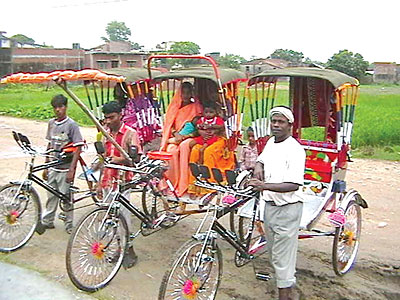 PROUD OWNERS: Rickshaw pullers from Kalaya, Bara District, who have purchased their rickshaws through social entrepreneur Ranjit Kanswar's organisation. |
Thirty-year-old Ranjit Kanswar runs a unique organisation in Kalaya of Bara district which helps locals purchase their own rickshaws. Instead of paying Rs 60 everyday to rent rickshaws from businessmen, they set aside Rs 25 per day to eventually own it in two years or so.
Kanswar won seed money for his business plan in a competition and began with five families. Now, with the returns, he is trying to work with 10 more families.
The enterprise is an example of an increasingly popular mode of doing business called social entrepreneurship. Traditional private sector or personal philanthropy can exist side-by-side, but many organisations are now adopting a formula that balances economy, ecology and social responsibility.
Contrary to traditional socially-driven organisations, social entrepreneurs use market-driven business models to address critical social and environmental issues. They don't measure returns in terms of shareholder dividend alone but aim for financial independence. Social enterprise is not just another fundraising strategy for non-profits, it is a long-term sustainable business that operates to redirect profits towards social and environmental goals.
The word "sustainability" may have become threadbare with overuse and misuse, but is still very relevant in the Nepal context. Most non-government bodies here are supported by international donors and fold up when funds run out. How can an organisation benefit others if it itself needs help to sustain? Revenue-generating models could be the answer.
It is a fine line between having a social mission and financial viability, but it can be balanced. The Kathmandu-based store, EcoKendra, networks with farmers and producers in rural areas to market their organic food and natural fibre products. EcoKendra offers wares at affordable prices, keeps its margin to be financially independent, but helps farmers in the process with fair prices.
Social enterprises have an advantage over solely profit-driven ventures. Combining social objectives with business actually works as a marketing tool and in brand-building. Knowing that what the money paid will trickle down to those who need it the most motivates consumers to pick such products and services over others.
Social enterprises have used social networking to bypass mainstream advertising and going directly to customers via Facebook, Twitter and blogs in direct relationship-building, awareness building, attracting and retaining customers.
The government can help with incentives to encourage social entrepreneurship, and not bundle them with traditional businesses. There isn't a lack of motivated people with innovative ideas in Nepal, but they lack entrepreneurial skills that will assist in translating them to marketplace solutions. They need trainings to equip them with strategy-oriented plans.
Last week, Global Platform Nepal conducted a week-long training for young participants to help them apply business principles to organise and manage social ventures. The word 'social' and 'non-profit' often seem to tag along with 'donors' and 'aid' in Nepal. But social organisations must find a way to survive and thrive without waiting on handouts forever.



